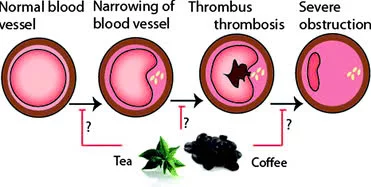Moderate coffee consumption may help reduce the risk of developing diabetes and cardiovascular diseases, according to a recent study published in the Endocrine Society’s Journal of Clinical Endocrinology & Metabolism. The study found that individuals who consume between 200 to 300 mg of caffeine per day, equivalent to about 2-3 cups of coffee, have a 40% lower risk of developing cardiovascular diseases and type 2 diabetes compared to those who consume little or no caffeine daily.

Experts confirm that coffee and tea contain numerous beneficial bioactive compounds, such as flavonoids and polyphenols, which have antioxidant and anti-inflammatory effects, supporting glucose and lipid metabolism in the body. These compounds may provide long-term health benefits that are not solely attributed to caffeine. However, it is crucial that consumption remains moderate, as excessive coffee intake can lead to unwanted side effects such as insomnia or anxiety.
“The findings from this study suggest that moderate coffee consumption can bring significant benefits in preventing cardiovascular diseases and type 2 diabetes,” according to Dr. Chaofu Ke, the lead author of the study from the School of Public Health at Suzhou University, China.
Previous studies have examined the effects of caffeine and coffee on cardiovascular health, but the results have not clearly established a relationship between coffee consumption and a reduced risk of cardiovascular and metabolic diseases. However, this study, based on data from over 360,000 participants using information from the UK Biobank, showed that moderate coffee drinkers reduced their risk of developing multiple cardiovascular diseases by 48.1%.
One important point that researchers emphasize is that coffee is not the only method for preventing these diseases. Other caffeinated beverages, such as sodas or energy drinks, do not provide the same health benefits due to their high sugar content. Therefore, opting for black coffee without sugar could be a better alternative to sugary drinks or those with additives.

The study also warns that, while coffee may have health-protective benefits, for some individuals, especially those with difficult-to-control cardiovascular diseases, hypertension, anxiety, or digestive issues, consuming too much caffeine may not be suitable. Therefore, people should adjust their coffee consumption to match their individual health needs.
“Adopting the habit of moderate coffee consumption can be a simple but long-lasting step in reducing the risk of diabetes and cardiovascular diseases.” However, an overall healthy lifestyle, including a balanced diet, regular exercise, and stress management, remains the most important factor in maintaining health.


HPX24h > Healthy Eating > Moderate Coffee Consumption Helps Reduce the Risk of Diabetes and Cardiovascular Diseases
Tagged Articles
How Losing Just 5% of Your Weight Can Reduce the Risk of Diabetes
Fruits That Can Spike Blood Sugar Levels: Be Cautious
Ways to Reduce Sugar in Your Diet to Prevent Diabetes
Top Reads from This Category
Healthy Eating
Why Is Nutrition Research So Complex?
Healthy Eating
Understanding the Important Role of Carbohydrates in Health
Healthy Eating
Robert F. Kennedy Jr.: “We Are Being Poisoned Without Knowing It”
Healthy Eating
The Comprehensive Guide to the 16:8 Intermittent Fasting Diet
Healthy Eating
Ways to Reduce Sugar in Your Diet to Prevent Diabetes
Healthy Eating
Types of Fats: Can Fats Be Good for You?
Healthy Eating
What Is Nutrition? Why Is It Important For Health?
Discover New Topics
Fitness
Exercise – The ‘Miracle Cure’ to Awaken Overall Health
Health
What Is Epigastric Pain and What Causes It
Fitness
HIIT: The Ultimate Shortcut to Efficient and Comprehensive Fitness
Health
Step-by-Step Guide to Safely Relieving Bloating in Children
Healthy Eating
The Reasons You Should Eat These Fruits During Pregnancy to Reduce Fatigue and Anemia
Fitness
Swimming: The Golden Key to Physical and Mental Well-Being
Parenting Tips
How Much Sleep Do Children Really Need?
Animals
The Stunning Image of a Cheetah in Action During Its Hunt
Science
Your Body Is Not the Same as It Was 10 Minutes Ago: The Continuous Regeneration Process of the Human Body
Health
The Best Days to Get Pregnant: How to Accurately Time Your Ovulation?
Fitness
HIIT Training: A Long-Term Remedy for Brain Health
Animals
Can Hyena Dogs Be as Smart as Primates?
Science
Discovery of a New Stem Cell: A Major Advancement in Creating Human Organs